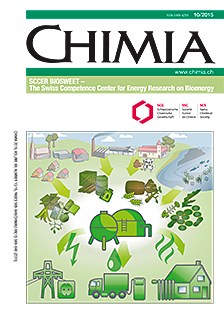Opportunities for Switzerland to Contribute to the Production of Algal Biofuels: the Hydrothermal Pathway to Bio-Methane
DOI:
https://doi.org/10.2533/chimia.2015.614Keywords:
Biofuel, Energy strategy 2050, Microalgae, Supercritical water gasification, Synthetic natural gas (sng)Abstract
Microalgae have a significant potential to be a sustainable source of fuel and thus are of interest in the transition to a sustainable energy system, in particular for resource-dependent countries such as Switzerland. Independence of fossil fuels, considerable reduction of CO2 emissions, and abandoning nuclear energy may be possible with an integrated system approach including the sourcing of biofuels from different types of biomass. Today, a full carbon-to-fuel conversion is possible, and has been recently demonstrated with an advanced hydrothermal technology. The potential to develop algal biofuels is viewed as high thanks to the possibility they offer to uncouple bioenergy from food production. Nevertheless, technological breakthroughs must take place before commercial production becomes a reality, especially to meet the necessary cost savings and efficiency gains in the algae cultivation structure. In addition, an integrated management of waste resources to promote the nutrient recovery appears today as imperative to further improve the economic viability and the environmental sustainability of algal production. We provide here a review that includes the global technological status of both algae production and their conversion into biofuels in order to understand first the added value of algal energy in general before we focus on the potential of algae to contribute specifically to the Swiss energy system to the horizon 2050. In this respect, the hydrothermal conversion pathway of microalgal biomass into synthetic natural gas (SNG) is emphasized, as research into this technology has received considerable attention in Switzerland during the last decade. In addition, SNG is a particularly relevant fuel in the Swiss context due to the existing gas grid and to the opportunity it offers to cover a wide spectrum of energy applications, in particular cogeneration of heat and electricity or use as a transport fuel in the growing gas car fleet.Downloads
Published
2015-10-28
Issue
Section
Scientific Articles
License
Copyright (c) 2015 Swiss Chemical Society

This work is licensed under a Creative Commons Attribution-NonCommercial 4.0 International License.
How to Cite
[1]
Chimia 2015, 69, 614, DOI: 10.2533/chimia.2015.614.







